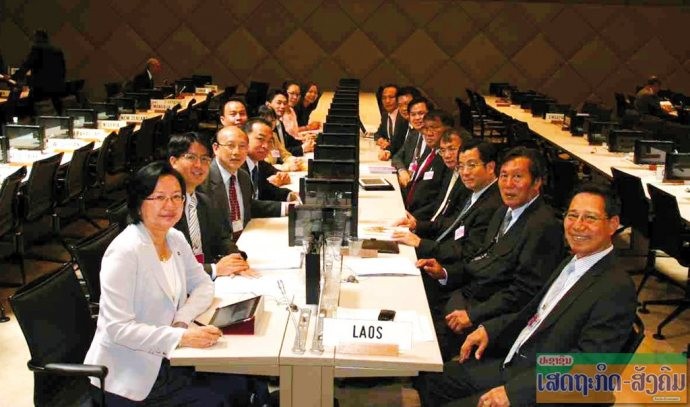Laos' membership talks accelerate with 'ambitious' target of joining WTO in 2012

With only one bilateral negotiation outstanding, and a number of new laws announced, Laos could join the WTO by the end of the year, the chairperson Yi Xiaozhun, China's ambassador, told the working party of delegations negotiating the membership bid.
, Laos' Industry and Commerce Minister Nam Viyaketh acknowledged that this is an ambitious target — Laos even aims for the working party to conclude the talks in October, perhaps in time for a formal General Council decision in October, and some members spoke of all legal formalities being completed so that Laos can become a member by the New Year of 2013.
"This is an ambitious goal, but the work done, the understanding of members of the difficulties least developed countries face in their transformation process, and the generous technical assistance we are receiving, make this a realistic objective," Mr Nam said.
Laos is officially the Lao People's Democratic Republic or Lao PDR. The working party's eighth meeting saw the first examination of a draft report, which will eventually be the core document in the membership agreement, describing the legislative and institutional reforms Laos has undertaken, and the commitments it will make.
For Laos to achieve its target, it will have to reply quickly to the latest questions on its trade regime and update its plans for new or revised laws, and wrap up the one remaining bilateral negotiation, with Ukraine. The working party could meet three times in 2012, the first time it has met more than once in a single year.
"Provided the authorities in Lao PDR work with purpose and speed on the submission of required inputs, it would be my intention, as the Working Party chairperson, in consultation with members and the Secretariat, to hold the next meeting in July, before the summer break, to wrap up the remaining issues of the working party report," Ambassador Yi said.
The entire draft accession package of documents could also be circulated before the summer break, "with a view to hold a final Working Party meeting in September or October," he said.
Accessions working parties consist of those WTO members that want to negotiate with the government applying for membership. The final decision on membership is taken by the full membership in the General Council or a ministerial conference.
Where is Laos now in its negotiation?
The talks are now in their "end-game stage", chairperson Yi said. The description is normally used when bilateral negotiations are almost complete, and when information supplied by the applicant on the laws and regulations it has in place or is planning to enact that affect its WTO obligations are sufficient to produce a draft working party report, the core document in the membership package. This was the first meeting to examine Laos' draft report.
Usually a few more working party meetings are needed to revise the draft report before it is accepted by the working party and ultimately the General Council. In the meantime, the applying government continues to answer questions, provide information and discuss its commitments.
As a least developed country (LDC), Laos's application is covered by the 2002 General Council guidelines for accelerating membership negotiations (document WT/L/508) and more recently the 2011 Ministerial Conference decision (document WT/L/846). Laos is also land-locked. In order to support the negotiations, Laos is receiving technical assistance from other WTO members. Laos thanked them for this and called for more.
Several developing and least developed countries focused their comments on calling for a swift entry for Laos, particularly under the General Council guidelines, and for WTO members to be flexible in the negotiations. They included Cambodia (for Laos' fellow-members in the Association of Southeast Asian Nations, ASEAN), Haiti (for least-developed countries), India, Saudi Arabia (for the Gulf Cooperation Council), China, Viet Nam, Pakistan, Qatar and fellow-applicant Yemen.
The US, EU, Canada, Chinese Taipei, Ukraine, Australia, Japan, Rep. of Korea and Switzerland said they support Laos' swift entry into the WTO, some referring to the technical assistance they have offered Laos, and welcomed the progress made bilaterally and multilaterally.
Bilaterals: The working party, which was set up in 1998 and first met in 2004, heard that Laos has now concluded bilateral agreements with Australia, Canada, China, the EU, Japan, Rep. of Korea, Chinese Taipei and most recently with the US (on 14 March).
Laos' only outstanding bilateral negotiation is with Ukraine. Both countries said the latest talks two days previously had narrowed the gaps between them. Several members urged Ukraine to be flexible and to follow various decisions on making membership easier for least developed applicants.
Ambassador Yi suggested they should try to conclude their talks by mid-April. Ukraine said that might be difficult even though it is flexible and pragmatic in striving for a quick agreement.
The bilateral market access deals in goods and services have to be built into a multilateral package, which will also include the new member's wide-ranging commitments on laws and measures designed to ensure its trade regime conforms to WTO rules.
Recent developments
Laos has revised its market access offers on goods and services in 2010. Since the last meeting in June 2011 it has submitted more information on a range of issues, including newly-enacted legislation.
Among the latest reforms Laos has introduced, Minister Nam said Laos has passed the necessary laws and regulations to ensure that they are now all in line with WTO requirements. He highlighted the import licensing regime, customs valuation, sanitary and phytosanitary measures (SPS — food safety and animal and plant health) and technical barriers to trade (TBT) saying progress on these are well on the way towards meeting WTO requirements. Laos is also working hard to revise its intellectual property law, he said (details in his statement, below).
In their questions, working party members asked about, commented on or praised Laos for progress on these issues.
Minister Nam thanked members for technical assistance, said his country is on track to pass all requirements by the end of the year, and has already demonstrated its political and administrative will.
Next
Chairperson Yi said the next meeting could be held in July.
Background
Laos Accession Working Party members (according to the latest official list, but regularly updated):
Australia, Bangladesh, Brazil, Brunei Darussalam, Cambodia, Canada, China, Dominican Republic, European Union, Haiti, Honduras, Hong Kong China, India, Japan, Rep. of Korea, Lesotho, Malaysia, Mongolia, Myanmar, Nepal, New Zealand, Nigeria, Panama, Paraguay, Philippines, Singapore, Switzerland, Chinese Taipei, Tanzania, Thailand, Ukraine, United States, Viet Nam, Zambia
Chairperson: Ambassador Yi Xiaozhun of China
Lao People's Democratic Republic applied to join the WTO on 16 July 1997. The General Council agreed to set up a working party on 19 February 1998. The working party met on 28 October 2004, 30 November 2006, 15 November 2007, 4 July 2008, 14 July 2009, 24 September 2010, 29 June 2011 and 16 March 2012.
Statement by H.E. Dr Nam ViyakethMinister of Industry and Commerce, Lao PDR8th Session of the Working Party on WTO Accession of Lao PDR
16 March 2012
Mr Chairman
I wish to express our sincere gratitude to the WTO Secretariat, Members and development partners for your keen participation in this meeting. I hope Members will appreciate the effort made by Lao PDR to get its trade regime in line with WTO rules. Lao PDR is ready to make a final and crucial effort towards the goal of joining the WTO by the end of this year. We sincerely hope that Members will give Lao PDR's accession their full attention and support.
We have made a substantial and concerted effort in our accession negotiations both on the bilateral and multilateral front and we can show substantial progress.
On the bilateral front, we have concluded all bilateral negotiations except one. Lao PDR has signed agreements with Australia, Canada, China, the European Union, Japan, Korea, Chinese Taipei and on the 14th of March with the United States. We are actively engaged with Ukraine with a narrow margin to reach final conclusion. With its good will and understanding, Lao PDR is confident that we will conclude this last bilateral negotiation very soon.
On the multilateral front, we have passed the necessary laws and regulations to ensure that they are now all in line with WTO requirements. Notably, our licensing regime, CVA [customs valuation], SPS [sanitary and phytosanitary measures] and TBT [technical barriers to trade] are well advanced in their full adoption of WTO requirements. At the request of WP members, we have been working hard to adopt all TRIPS dispositions in a revised law. I take the opportunity to thank our friends for useful comments we have received.
Licensing: Goods subject to import licenses have been drastically reduced and our whole licensing system has been completely revised and brought up to international standards. Only nine products now require an automatic import license, while non automatic licenses only apply to the importation of guns and bullets, explosives and gold bars. The Questionnaire on Import Licensing Procedures has been submitted and this provides a clear picture of the import licensing system.
Customs: Lao PDR has revised its Customs Law to be in line with the CVA. We plan to bring our legislation into full compliance with WTO rules by 2012 and to ensure full implementation by accession. Reference prices are now only applied to six products, which will be eliminated upon accession. Thanks to technical assistance received, the introduction of the ASYCUDA [Automated SYstem for CUstoms Data] system is progressing well, with the aim to streamline the customs processes by harmonizing procedures within international norms.
Lao PDR's system for sanitary and phytosanitary measures has undergone major reforms, and is still going through a major overhaul in order to incorporate all of the principles and rules of the SPS Agreement. Lao PDR adopts standards and recommendations of the IPPC, the OIE and the Codex Alimentarius. The updated Action Plan reflects the work being done in this area, with a number of regulations and decrees adopted in 2011 and 2012. Thanks to the generous support of WTO members, Lao PDR is confident that it can fully implement the SPS agreement by January 2015.
Lao PDR has embarked on a major reform effort to bring its technical regulations, standards and conformity assessment into conformity with the TBT Agreement, taking into account technical difficulties. The updated Action Plan shows that Lao PDR completed its re-assessment of the institutional, legal and regulatory framework, identifying precise capacity constraints and the technical assistance needed. The legal and organisational decisions concerning the establishment of TBT and SPS Enquiry Points and Notification Units have been taken, enabling Lao PDR to take the commitment to have them operational upon accession. Lao PDR will fully implement the TBT agreement by January 2015.
Intellectual property rights: Lao PDR is a member of the WIPO [World Intellectual Property Organization], a signatory to the Paris Convention and the Patent Cooperation Treaty, and as of this week, an official member of the Berne Convention and the "Berne Union".
Lao PDR completely revised the 2007 Intellectual Property Law, taking into account the TRIPS requirements and Members' comments. Its translation would be available within the coming weeks. Work has accelerated in order to achieve the goal to have all legislation in line with the TRIPS Agreement including its flexibilities for LDCs [least developed countries] by the end of this year, and have it fully implemented by January 2016.
In addition, I am pleased to highlight other reforms undertaken throughout our accession process. Our major achievements include:
Trading rights: Internal coordination and policy decisions in the right direction allowed us to bring our trading rights regime into compliance with the WTO through the adoption of the Decree on Import and Export of Goods.
Import regulations including on agriculture: Lao PDR has abolished all bans and import quotas for agricultural products and presently does not apply any seasonal restrictions, prohibitions or other controls. Lao PDR has only ad valorem duties, applies no quotas, no tariff quotas and has no "other duties and charges".
Foreign exchange and payments: Lao PDR has undergone a major conversion, by going from a managed system to an open system, complying with the obligations of Article VIII of the IMF.
Pricing policy is now determined by the market mechanism thanks to the revised Decree on Prices of Goods and Services.
Investment regime: The new Investment Promotion Law and its Implementing Decree treat domestic and foreign investment on an equal footing and are fully in compliance with WTO rules. Lao PDR's industrial policy is in line with WTO requirements, with the newly adopted official repeal to local content requirements. .
Internal taxes are applied to local products and imports in an identical way through the harmonization of previously different excise and turnover tax rates thanks to the revised Tax Law adopted by the National Assembly in December 2011. The Value Added Tax is being implemented.
Fees and charges: All fees and charges for services have been converted to fixed amounts according to the costs of the services rendered.
Export duties: Lao PDR only applies a limited number of export duties for development and revenue purposes. Export restrictions have been brought in line with WTO requirements.
We hope this fully reflects the progress made by Lao PDR to bring its trade and economic framework fully in line with WTO requirements. We have streamlined procedures, increased transparency, reduced restrictions and committed to opening our markets to a level that has satisfied all our bilateral partners but one we are actively negotiating with. Lao PDR wants to fully participate and contribute to the multilateral trading system. Lao PDR is convinced that this objective is within reach. Clearly this will require effort and the goodwill of all parties concerned and full respect of the 2002 LDC Accession Guidelines.
Mr. Chairman,
Lao PDR understands that there is still hard work to be done, not only to have all adopted legislation promulgated to share with Working Party Members, but even further, to implement all commitments and make our legislation operational. But we are not afraid of hard work and we realize that changing to an open market economy is a long process requiring not only new laws but a change in the mindset. We are fully committed to do just that to ensure our long term sustainable development in line with international requirements and best practices. Our goal is to substantially conclude our accession negotiations by mid-2012 to have our last Working Party Meeting by the end of this year when the Asia-Europe Summit will be held in Vientiane. This is an ambitious goal, but the work done, the understanding of the Members of the difficulties LDCs face in their transformation process and the generous technical assistance we are receiving, make this a realistic objective.
With these words I thank you, Mr Chairman



